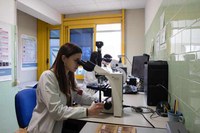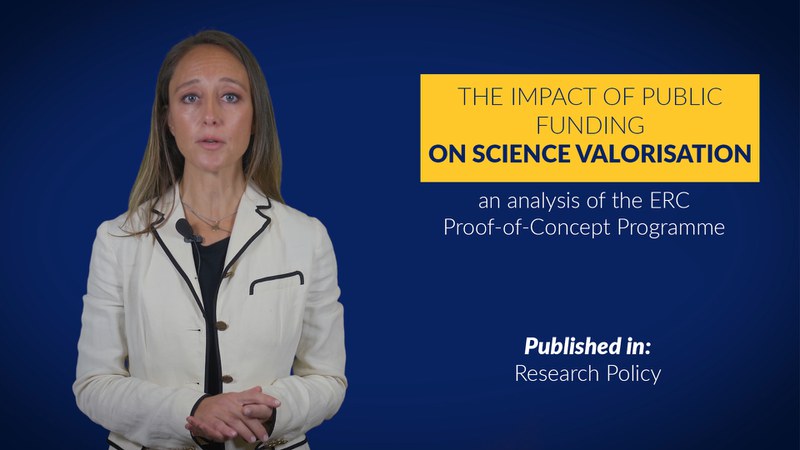The impact of public funding on science valorisation: an analysis of the ERC Proof-of-Concept Programme
Published in: Research Policy

Knowledge transfer between research, industry, and society represents a powerful engine of progress and inclusive growth. However, several barriers limit the successful transformation of scientific breakthroughs into new products or services.
To address these missed opportunities for economic and social progress, several public financial schemes have arisen at the national, regional, and university levels to support the translation of scientific discoveries into commercial applications.
The effectiveness of these instruments is not straightforward and obvious for several reasons, mainly linked to the fact that valorization activities require a different set of competencies, motivations, and values from those required to conduct frontier research.
In this paper, we provide the first comprehensive analysis of the effects of a major public funding program in support of science valorization activities: the Proof-of-Concept Programme (PoC) of the European Research Council (ERC), the European Union’s premier funder established in 2007 to improve the quality of Europe’s science.
The PoC grant was established in 2011 as a way to verify the innovation potential of ideas arising from previous ERC-funded projects. It covers activities during the very early stage of turning research outputs into commercial or socially valuable propositions, such as prototype building and testing, patent filing, market assessment, business planning, and connecting to late-stage funding.
We compare the valorization outcomes of projects that obtained the ERC PoC grant to a group of projects that applied to the PoC scheme but were not funded. To do so, we draw on data from an original survey distributed to all academic researchers who received ERC funding under the 7th Framework Programme (FP7), including both those who received a subsequent PoC grant and those who applied for PoC funding but did not receive it. The data used in this study refer to the 242 survey responses obtained from ERC PoC grant holders and the 204 responses from ERC PoC applicants who were not funded (and constituting our control group).
Our assessment applies a broad vision of impact by focusing on different ways to gain science valorization:
- commercialization - via licensing agreements or the creation of a startup company
- academic engagement - via collaborative R&D, R&D contracts or consulting activities
- further development – via the ability to attract additional public or private funding
Moreover, we assess whether these outputs are influenced by the academic seniority of the principal investigator of the project.
Our results find that the ERC PoC program has been effective in fostering the early valorization of scientific discoveries. By all the measures of valorization success described above, projects that had received the grant performed significantly better than those that had not. Overall, our findings support this type of policy instrument as a catalyst to accelerate the transition of scientific results toward commercial and societal applications.
31% of the overall sample report the achievement of at least one type of valorization outcome. By focusing only on commercialization or academic engagement, the percentage becomes 18% and 23%, respectively. Meanwhile, our data show that 31% of ERC PoC applicants were successful in obtaining additional (non-ERC) funding. From the comparison between treated (i.e., granted) and not treated (i.e., not granted) groups, the likelihood of positive valorization outcome is significantly higher in the group of PoC grantees compared to the control group (around 46% in the treated group, compared to around 14% of cases in the control group) and the same trend is confirmed by zooming in specific types of valorization activities (27% vs. 8% for commercialization, 33% vs. 11% for academic engagement, 39% vs. 21% for follow-on funding attraction).
Moreover, we highlight that the effectiveness of valorization funding tends to be more pronounced in the specific case of early-stage researchers. This interesting result confirms the relevant role of PoC in addressing the funding gap that limits the transformation of research into practical and commercial applications, especially for junior researchers who, in the extant literature, have been considered less active in these types of activities.
Thus, this study suggests that PoC schemes successfully improve the maturation and innovation potential of technologies and projects generated from university research, thus concretely filling the “funding gap” faced by early-stage valorization projects. At the same time, the availability of well-designed PoC programs emerges as a critical component in a technology transfer ecosystem, in particular, to encourage the engagement of early-stage researchers in this area, thus addressing also the “motivational gap” of their principal investigators.
The successful experience of the ERC Proof-of-Concept program should thus encourage the replication of PoC-type programs among EU member states and other countries, including developing countries.
In recent years, France, Germany, and Poland (to cite some) have undertaken this type of initiative. However, despite the importance of PoC policy schemes, their diffusion across countries and individual universities are still limited. Policymakers interested in the design and implementation of these programs for science valorization, however, need to pay attention to carefully considering the national contextual contingencies and, in particular, the degree to which technology transfer practices are implemented at the national level, as this factor significantly impacts the effectiveness of the programs.
Read the full article.
Authors at the Department of Management
FEDERICO MUNARI – Full Professor
Academic disciplines: Entrepreneurship, Innovation
Teaching areas: Business Economics, Innovation Management
Research fields: technology transfer, technology commercialization, patents, venture capital, and innovation
Federico is a Full Professor of Technology and Innovation Management at the Department of Management. He has been Visiting Researcher at MIT Sloan School of Management and Ecole des Mines de Paris. He is the Coordinator of the MSc in Management Engineering of the University of Bologna. He has been the Coordinator of the Ph.D. Program in General Management at the University of Bologna.
LAURA TOSCHI – Associate Professor
Academic disciplines: Entrepreneurship, Innovation
Teaching areas: Business Economics, Innovation Management
Research fields: technology transfer, technology commercialization, patents, venture capital and innovation, sustainable entrepreneurship, clean-technologies
Laura is an Associate Professor in Entrepreneurship and Innovation Management at the Department of Management and serves as Deputy Director of the Executive Master in Technology and Innovation Management at the Bologna Business School. She received an ESRC Fellowship at SPRU and has been visiting professor at Boston University, the University of Queensland, and the Queensland University of Technology.
